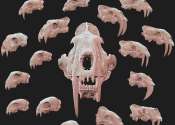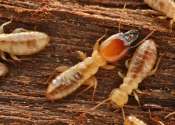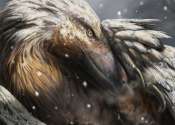Last update:
Biology news

Mystery CRISPR unlocked: A new ally against antibiotic resistance?
CRISPR-Cas systems have revolutionized biotechnology by offering ways to edit genes like a pair of programmable scissors. In nature, bacteria use these systems to fight off deadly viruses. A recent international collaboration ...
Biotechnology
10 hours ago
0
19

Sea otter study finds tool use allows access to larger prey, reduces tooth damage
Sea otters are one of the few animals that use tools to access their food, and a new study has found that individual sea otters that use tools—most of whom are female—are able to eat larger prey and reduce tooth damage ...
Plants & Animals
11 hours ago
0
27

Protein prediction technology yields accurate results to efficiently find the best drug candidate for many conditions
Artificial intelligence (AI) has numerous applications in health care, from analyzing medical imaging to optimizing the execution of clinical trials, and even facilitating drug discovery.
Biotechnology
11 hours ago
0
34

New sensor gives unprecedented look at changes in ATP levels inside a cell
Just as the US economy runs on the dollar, the cellular economy runs on adenosine triphosphate (ATP). The energy-carrying molecule fuels nearly all processes inside the cell, making ATP critical for cellular life.
Cell & Microbiology
11 hours ago
0
46

Bioengineered enzyme creates natural vanillin from plants in one step
Vanilla extract is one of the most widely used flavoring compounds in food products and cosmetics. The pleasant and sweet smell of this classic flavor is imparted by the chemical compound "vanillin" found in the seed pods ...
Cell & Microbiology
13 hours ago
0
12

Researchers discover new family of bacteria with high pharmaceutical potential
Most antibiotics used in human medicine originate from natural products derived from bacteria and other microbes. Novel microorganisms are therefore a promising source of new active compounds, also for the treatment of diseases ...
Cell & Microbiology
16 hours ago
0
80

How saber-toothed tigers acquired their long upper canine teeth
An international team led by scientists from the University of Liège has investigated the evolutionary patterns behind the development of saber teeth, with some unexpected results along the way. Their study has been published ...
Evolution
14 hours ago
0
37

Study highlights pathoblockers as a future alternative to antibiotics
In most cases, antibiotics are a reliable form of protection against bacterial infections. They have saved billions of human lives since their introduction. This protection, however, is threatened by bacteria's resistance ...
Cell & Microbiology
13 hours ago
0
8

Research identifies mechanism behind drug resistance in malaria parasite
Collaborating researchers have discovered a link between malaria parasites' ability to develop resistance to antimalarial drugs—specifically artemisinin (ART)—through a cellular process called transfer ribonucleic acid ...
Cell & Microbiology
14 hours ago
0
23

Study shows regenerating worms have genetic control over their algal partners
Many organisms are far more complex than just a single species. Humans, for example, are full of a variety of microbes. Some creatures have even more special connections, though.
Ecology
14 hours ago
0
1

Norway spruce in Finland is susceptible to European spruce bark beetle damage especially near clear-cuts: Study
In Finland, the European spruce bark beetle prefers mature Norway spruce forests close to recent clear-cut sites, a new study from the University of Eastern Finland finds.
Ecology
8 hours ago
0
1

A spider silk sound system: Webs match acoustic particle velocity for long-distance sound detection
The best microphone in the world might have an unexpected source: spider silk. Spiders weave webs to trap their insect snacks, but the sticky strands also help spiders hear.
Plants & Animals
15 hours ago
0
95

Seafloor life devastated near explosive volcanic eruption in Pacific, research shows
A University of Rhode Island oceanographer leading her first research cruise in the southern Pacific uncovered a surprise when her vessel looked below the waters in the Polynesian nation of Tonga.
Ecology
15 hours ago
0
30

Genetic analyses show how symbiotic bacteria in termite gut has changed over course of evolution
Researchers at the Max Planck Institute for Terrestrial Microbiology in Marburg, Germany, have analyzed the evolutionary development of symbiotic bacteria in the intestines of termites with regard to their metabolic capabilities.
Evolution
8 hours ago
0
5

Identifying appropriate pondscapes for protecting amphibians
How many ponds should we create? What should they look like? And where is a good location? These are the questions most frequently asked by nature conservation experts when it comes to protecting amphibians.
Plants & Animals
8 hours ago
0
1

New method produces fresher, tastier cold-pressed Concord grape juice
A new process developed at Cornell AgriTech can produce antioxidant-rich cold-pressed Concord grape juice with a longer shelf life, meeting rising demand for minimally processed juices that are tastier and more nutritious.
Agriculture
8 hours ago
0
19

AI reveals critical gaps in global antimicrobial resistance research
Artificial intelligence (AI) has helped identify knowledge, methodological and communication gaps in global antimicrobial resistance (AMR) research.
Cell & Microbiology
9 hours ago
0
44

Orcas are attacking ships again: Here's a history of the practice
A pod of killer whales attacked and sank a yacht over the weekend between Spain and Morocco in the Strait of Gibraltar—and it's not the first time.
Plants & Animals
9 hours ago
0
24

Researchers uncover how jelly sea creatures might shape modern robotics
Scientists at the University of Oregon have discovered that colonies of gelatinous sea animals swim through the ocean in giant corkscrew shapes using coordinated jet propulsion, an unusual kind of locomotion that could inspire ...
Plants & Animals
14 hours ago
0
1

Ambitious goal to sequence RNA could boost US economy
A chemist who leads the University of Cincinnati's Office of Research is playing a role in a scientific undertaking to unlock the secrets of RNA.
Molecular & Computational biology
9 hours ago
0
1
More news

Rare deep-sea squid filmed at depth

Scientists brew killer bee beer

Stiffness and viscosity of cells found to differ in cancer and other diseases

Proteomic analysis reveals how phosphite contributes to the fight against chemically resistant dieback

AI can help researchers understand what viruses are up to in the oceans and in your gut

Fast track to food safety: New test spots seafood pathogen in 30 minutes

How can understanding misfolded proteins help improve disease treatments?

Research reveals key genetic factors in snap bean pod traits

The genetic basis and process of inbreeding depression in an elite hybrid rice
Other news

Ion swap dramatically improves performance of CO₂-defeating catalyst

Researchers develop a detector for continuously monitoring toxic gases

Shedding light on perovskite hydrides using a new deposition technique

Carbon pricing works, major meta-study finds

AI expected to unravel secrets of non-coding genes

Heating proteins to body temperature reveals new drug targets

New research addresses alleged benefits of a vegan diet for dogs

Killer whales breathe just once between dives, study confirms

A second chance for a new antibiotic agent

Quantum experts review major techniques for isolating Majoranas


















































